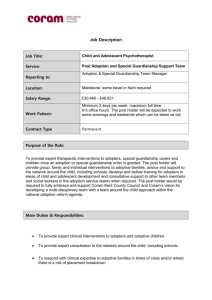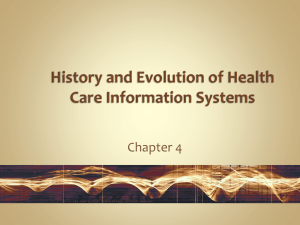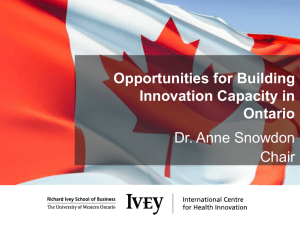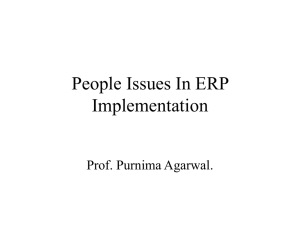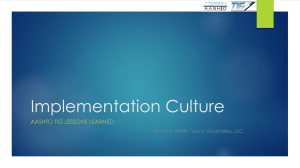MINISTERSTWO PRACY I POLITYKI SPO*ECZNEJ
advertisement
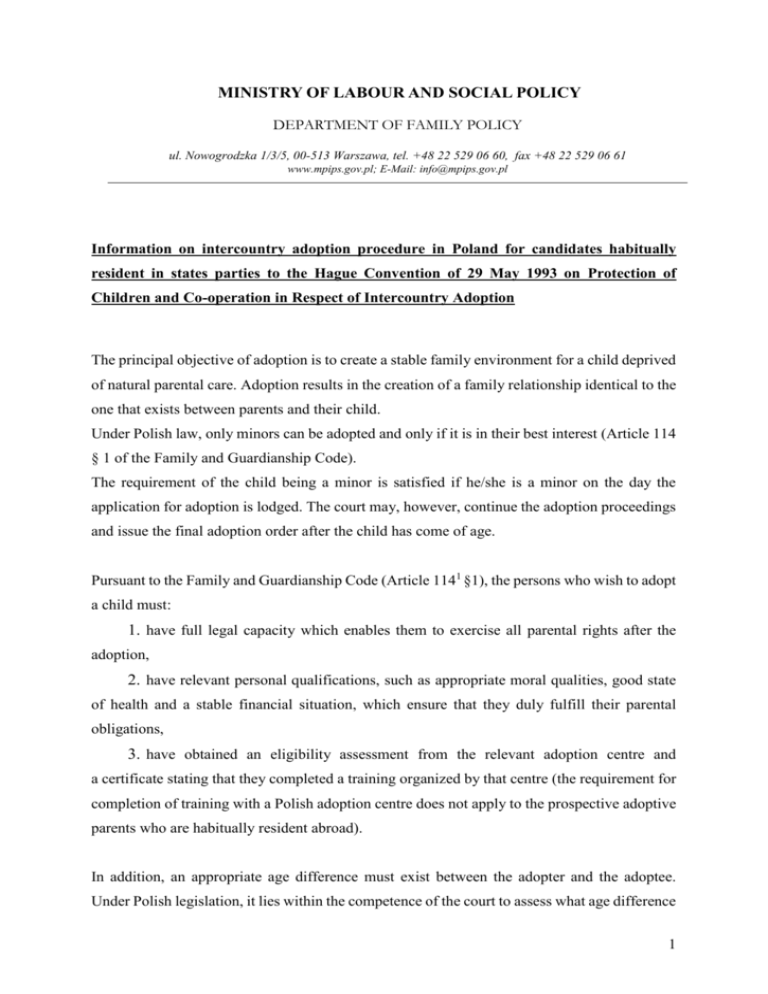
MINISTRY OF LABOUR AND SOCIAL POLICY DEPARTMENT OF FAMILY POLICY ul. Nowogrodzka 1/3/5, 00-513 Warszawa, tel. +48 22 529 06 60, fax +48 22 529 06 61 www.mpips.gov.pl; E-Mail: info@mpips.gov.pl Information on intercountry adoption procedure in Poland for candidates habitually resident in states parties to the Hague Convention of 29 May 1993 on Protection of Children and Co-operation in Respect of Intercountry Adoption The principal objective of adoption is to create a stable family environment for a child deprived of natural parental care. Adoption results in the creation of a family relationship identical to the one that exists between parents and their child. Under Polish law, only minors can be adopted and only if it is in their best interest (Article 114 § 1 of the Family and Guardianship Code). The requirement of the child being a minor is satisfied if he/she is a minor on the day the application for adoption is lodged. The court may, however, continue the adoption proceedings and issue the final adoption order after the child has come of age. Pursuant to the Family and Guardianship Code (Article 1141 §1), the persons who wish to adopt a child must: 1. have full legal capacity which enables them to exercise all parental rights after the adoption, 2. have relevant personal qualifications, such as appropriate moral qualities, good state of health and a stable financial situation, which ensure that they duly fulfill their parental obligations, 3. have obtained an eligibility assessment from the relevant adoption centre and a certificate stating that they completed a training organized by that centre (the requirement for completion of training with a Polish adoption centre does not apply to the prospective adoptive parents who are habitually resident abroad). In addition, an appropriate age difference must exist between the adopter and the adoptee. Under Polish legislation, it lies within the competence of the court to assess what age difference 1 is appropriate in each particular case. The Polish regulator has not specifically indicated what age difference is the appropriate one, as has been the case in certain other countries. In accordance with Article 115 §1 of the Family and Guardianship Code, only a married couple has the right to jointly adopt a child. Marriage is understood as a union of man and woman. Adoption by a single person is also possible. As a rule, single persons adopt older children to whom they can represent role models and provide support. The decisive factor here is the ability of the single person to demonstrate during the adoption eligibility procedure that they can rely on their family members for support in the process of child upbringing. Adoption requires the child’s consent for being adopted if he or she is thirteen years of age. However, the guardianship court should hear even a child under thirteen if he or she can comprehend the meaning of adoption. The court may, by way of exception, rule on adoption without requiring the adoptee’s consent, or without hearing the adoptee if the adoptee is incapable of expressing consent, or if the assessment of the relation between the adopter and the adoptee proves that the child considers himself/herself a child of the adopter, and the requirement of consent, or hearing the child would be contrary to the child’s welfare. Moreover, adoption requires the consent of the natural parents of the child, unless the parents are deprived of parental care and custody, are unknown or an agreement with parents is facing obstacles difficult to overcome. The guardianship court may, by reason of special circumstances, rule on adoption despite the lack of parental consent if the parents have limited legal capacity, and refusal of consent is manifestly contrary to the child’s welfare. If the child is under guardianship, the legal guardian’s consent is required to complete an adoption. However, the guardianship court may, by reason of special circumstances, rule on adoption despite the lack of guardian’s consent if this is in the child’s best interest. Furthermore, pursuant to Article 167 of Act of 9 June 2011on support for families and the foster care system (Journal of Laws of 2013, item 135 as amended), a child may be qualified for adoption which results in the change of domicile of the adopted child from Poland to another country. The intercountry adoption may take place only after exhaustion of all possibilities of finding for an adoptee a family in Poland, unless the adoptive parent is either related to the adoptee or he/she has earlier adopted the brother or sister of the child. This means in practice that children qualified for intercountry adoption are usually older children (6-7 years old and more), groups of siblings, children who are ill or have developmental delays, and for whom no suitable family was found in the country of origin. 2 Adoption is decreed by the guardianship court, the family and juvenile division of the regional court, upon application lodged by the person or persons (married couple) who wish to adopt (Article 117 of the Family and Guardianship Code, Article 585 § 1 of the Civil Procedure Code). The application shall be lodged with the guardianship court having jurisdiction over the domicile of the applicant or the child (Article 585 §2 of the Civil Procedure Code). The court’s ruling on adoption takes effect after it has acquired the authority of a final decision. For intercountry adoptions taking place in compliance with the Hague Convention of 29 May 1993 on Protection of Children and Cooperation in Respect of Intercountry Adoption (hereinafter the Hague Convention), the court shall also issue a certification stating that the adoption was made in accordance with the Convention. In accordance with Article 14 of the Hague Convention, persons habitually resident in a Contracting State, who wish to adopt a child habitually resident in another Contracting State (in this case Poland), shall apply to the Central Authority in the State of their habitual residence, or to another organization authorized by the Central Authority, with a view to preparing a report referred to in Article 15 of the Convention. The dossier of the prospective adoptive parents is subsequently transmitted by the central authority of the receiving country (i.e. the central authority of the country where the applicants are habitually resident) or another organization authorized for that purpose by the central authority, to the Polish central authority. In those cases where the adoption involves the intermediation of an accredited foreign body, the documents are transmitted directly to the adoption centre with which the accredited body cooperates. In accordance with Article 6 of the Hague Convention Ministry of Labour and Social Policy performs the functions of the Polish Central Authority. Pursuant to the notice issued by the Minister of Labour and Social Policy of 11 October 2013, the following adoption centres have been authorized to cooperate with the Central Authorities in other states, or with the relevant bodies or adoption centres duly licensed by the governments of other states: 1. Mazowieckie Centrum Polityki Społecznej Wojewódzki Ośrodek Adopcyjny (Mazovian Centre of Social Policy, Provincial Adoption Centre), 00 – 301 Warszawa, ul. Nowy Zjazd 1; 2. Krajowy Ośrodek Adopcyjny TPD (National Adoption Centre of the Children’s Friends Society), 00-325 Warszawa, ul. Krakowskie Przedmieście 6; 3 3. Katolicki Ośrodek Adopcyjny (Catholic Adoption Centre), 04-357 Warszawa, ul. Grochowska 194/196. An Adoption Qualification Board operating in each adoption centre matches an appropriate adoptive family to a child/ren, based on specific needs of the child/ren. Subsequently, complete documentation concerning both the candidates and the child/ren is transferred to the Ministry of Labour and Social Policy for approval in compliance with Article 17 c of the Convention. Accordingly to the act on family assistance and foster care system, Ministry of Labour and Social Policy issues an agreement that the adoption may proceed prior to the first meeting of prospective adoptive parents with a child. The candidates applying for adoption are required to submit the following documents which should be translated into Polish by a sworn translator and certified as authentic (Apostille stamp or legalized): 1. Application for child/children adoption; 2. Certified copies of birth certificates of prospective adoptive parents; 3. Certified copy of marriage certificate; 4. Criminal records clearance check; 5. Evidence of employment and proof of earnings; 6. Proof of citizenship (e.g. certified copies of passports); 7. Medical records – certificate attesting to lack of medical contraindications; 8. Home study conducted by a licensed agency; 9. Consent of the Central Authority of the country of origin of the applicant(s), issued in the name of the applicant(s), as well as permits which would allow the child to enter and reside permanently in the receiving country. Article 120 1 of the Family and Guardianship Code provides that in the event that the adoption results in the change of domicile of the adopted child from the Republic of Poland to another country, before the final adoption order is issued, the guardianship court sets a mandatory period of personal contact between the prospective adoptive parent and the child at the child’s domicile or in another place in the Republic of Poland. 4 When exercising supervision over the contact between the adopter and the adoptee, the guardianship court is aided by the adoption centre and, if necessary, by a subsidiary body for matters relating to guardianship. Polish law governing adoption: 1. Act of 25 February 1964 The Family and Guardianship Code (Journal of Laws of 2012, item 788, as amended), 2. Act of 17 November 1964 – Civil Procedure Code (Journal of Laws of 1964, no 43, item 296, as amended), 3. Act of 9 June 2011 on Family Support and Foster Care (Journal of Laws of 2013, item 135, as amended), 4. Act of 25 July 2014 on amending the act on Family Support and Foster Care and some other acts (Journal of Laws of 2014 item 1188), 5. Act of 26 June 1974 – Labour Code (Journal of Laws of 1998, no. 21, item 94, as amended), 6. Act of 29 September 1986on Certificates of Personal Status (Journal of Laws of 2011, no. 212, item 1264, as amended), 7. Act of 4 February 2011 Private International Law (Journal of Laws no.80, item 432), 8. Regulation of the Minister of Labour and Social Policy of 9 December 2011 on training for prospective adoptive parents (Journal of Laws 272, item 1610), 9. Regulation of the Minister of Labour and Social Policy of 22 December 2011 on home study questionnaire and child data form (Journal of Laws no. 292, item 1721). Selected international agreements governing adoption: 1. The United Nations Convention on the Rights of the Child of 20 November 1989 (Journal of Law 1991, no.120, item 526). 2. Convention on Protection of Children and Co-operation in Respect of Intercountry Adoption of 29 May 1993, the Hague Convention (Journal of Laws 2000, no. 39, item 448). 3. European Convention on the Adoption of Children of 24 April 1967, so called Strasbourg convention (Journal of Laws of 1999, no. 99, item 1157). 5


